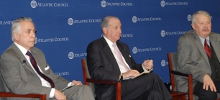
On January 27, the Atlantic Council held an off-the-record discussion on developments in Russia and in US-Russian relations with Dr. Sergey Rogov, the director for the Institute for US and Canadian Studies at the Russian Academy of Sciences. Ambassador Richard Burt, Senior Advisor at McLarty Associates and member of the Atlantic Council’s Board of Directors, participated in the discussion, which was moderated by Dr. Harlan Ullman, Senior Advisor at the Atlantic Council and a member of its Strategic Advisors Group.
Remarks made in this discussion reflected on how the Cold War and subsequent developments continue to affect US-Russian relations, the reset and where it may go, how domestic developments in Russia and the United States, including the elections that take place in 2012, may affect relations, and other current and upcoming issues. These included the rise of Asia, other geostrategic trends, and how they affect the relationship and perceptions of it in capitals; nuclear weapons, common proliferation concerns, and ballistic missile defense; Russia’s WTO accession, the Jackson-Vanik Amendment and human rights, and prospects for economic cooperation; and Afghanistan.
Featuring
Dr. Sergey Rogov
Director, Institute for US and Canadian Studies, Russian Academy of Sciences
With discussant
Ambassador Richard Burt
Senior Advisor, McLarty Associates
Moderated by
Dr. Harlan Ullman
Senior Advisor, Atlantic Council
